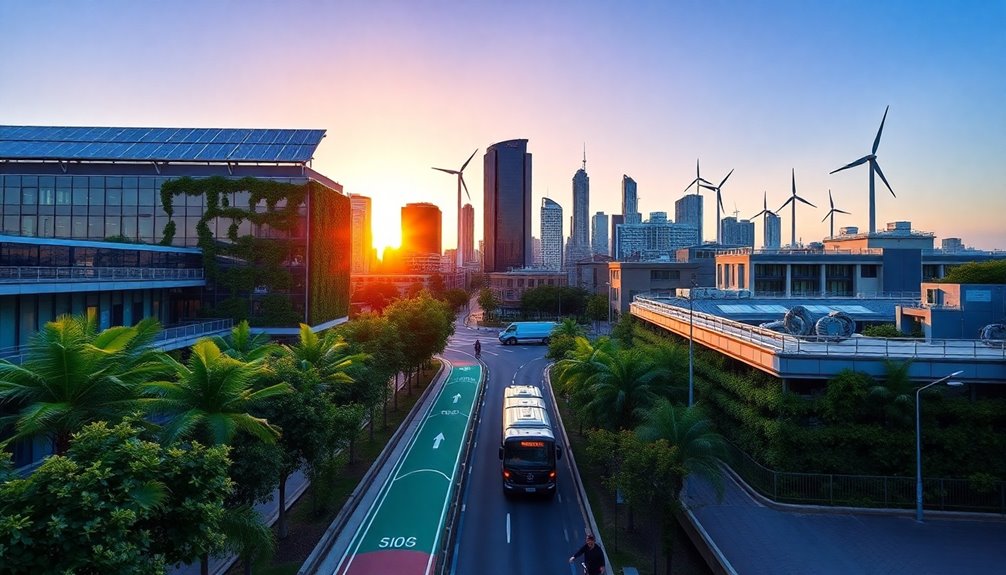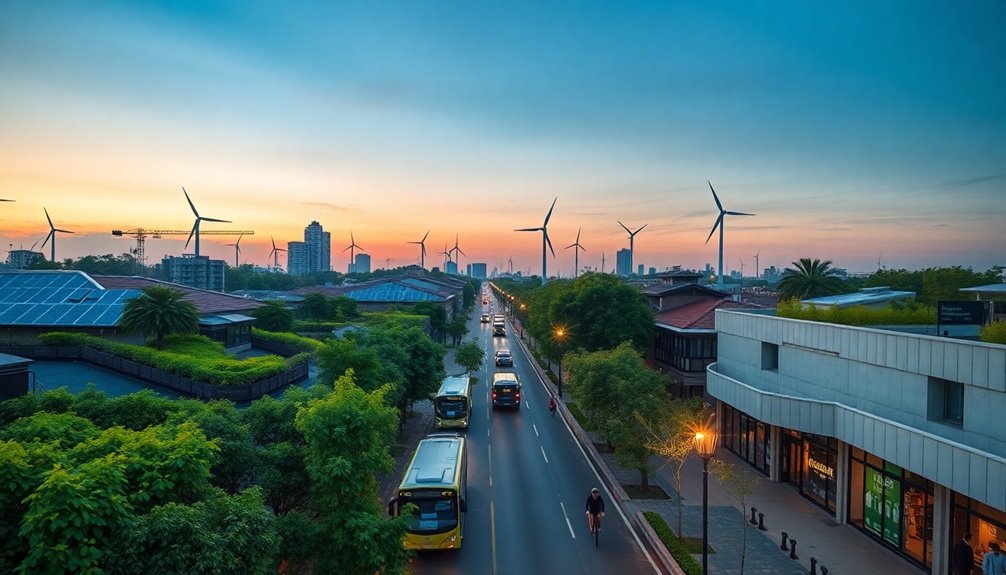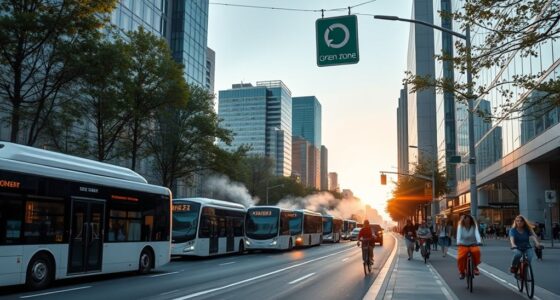To effectively tackle urban decarbonization, you need to prioritize energy efficiency, transition to renewable energy sources, and support sustainable transportation. Focus on improving building insulation and implementing smart lighting systems. Additionally, promote waste reduction initiatives and adopt green building practices. Embrace smart technology and establish financial frameworks like green bonds to fund these efforts. Each action plays a crucial role in reducing emissions. Discover even more strategies tailored for effective decarbonization in your journey ahead.
Key Takeaways
- Urban decarbonization requires energy efficiency measures such as improved building insulation and smart lighting systems to reduce emissions significantly.
- Transitioning to renewable energy sources like solar and wind power is essential for sustainable urban energy systems.
- Implementing green building practices and smart technologies optimizes energy consumption and enhances the living environment within urban spaces.
- Effective waste management through recycling and composting plays a critical role in minimizing waste and emissions in cities.
- Financing frameworks, including green bonds and carbon pricing, are vital for supporting sustainability initiatives and incentivizing emissions reductions.

As cities continue to grow, the urgent need for urban decarbonization strategies becomes increasingly clear. You can play a vital role in implementing energy efficiency measures, such as improving building insulation and adopting smart lighting systems. These steps not only cut emissions but also lower energy bills, making them a win-win for both the environment and your wallet.
Transitioning to renewable energy sources like solar, wind, and geothermal power is another key strategy. By supporting these initiatives, you contribute to a cleaner energy grid. Encouraging sustainable transportation, whether through walking, cycling, or electric vehicles, will help reduce the carbon footprint of urban commuting.
Supporting renewable energy and sustainable transportation is essential for reducing urban carbon footprints and fostering a cleaner energy future.
You'll find that developing pedestrian-friendly spaces and enhancing public transportation systems can make a significant difference in your city's emissions.
When it comes to construction, green buildings are essential. Using sustainable materials, implementing green roofs, and utilizing smart building technologies can drastically improve energy efficiency. This means more comfortable living and working spaces for everyone, along with a healthier environment.
Waste management is also crucial. You can advocate for waste reduction initiatives, recycling programs, and composting efforts in your community. By supporting circular economy principles, like reuse and repair programs, you help minimize waste and reduce landfill emissions.
Technology plays a critical role in these strategies. Smart grids optimize energy distribution, while carbon capture and storage help remove CO2 from the atmosphere. You can also benefit from building energy management systems that monitor and enhance energy usage in real time.
Finally, financing and policy frameworks are essential to support these initiatives. Green bonds and public-private partnerships can provide the necessary funding, while carbon pricing mechanisms encourage emissions reductions.
Frequently Asked Questions
What Are the Economic Benefits of Urban Decarbonization?
Urban decarbonization brings you a host of economic benefits.
You'll see job creation and lower healthcare costs from improved air quality. Investing in low-carbon infrastructure enhances property values and attracts businesses, boosting local economies.
With renewable energy, you can tap into new employment opportunities, while energy efficiency measures save money for households and businesses.
How Can Citizens Participate in Decarbonization Efforts?
Imagine a vibrant community, where every voice echoes a commitment to a cleaner future.
You can participate in decarbonization by joining local workshops and forums, sharing your thoughts on sustainable practices. Together, you'll identify solutions tailored to your neighborhood's needs.
What Role Does Technology Play in Urban Decarbonization?
Technology plays a crucial role in urban decarbonization by optimizing energy management and transportation systems. You can leverage smart grids and advanced sensors to reduce waste and emissions in your city.
By utilizing data analytics, you can support efficient urban planning and decision-making. Additionally, integrating renewable energy sources and implementing energy-efficient measures, like smart buildings, helps create a sustainable environment.
Embracing these technologies allows you to actively contribute to a greener future.
Are There Successful Case Studies of Urban Decarbonization?
Yes, you can find successful case studies of urban decarbonization around the world.
For instance, cities like Oslo have embraced electric public transport and implemented extensive cycling infrastructure, significantly reducing emissions.
Boston's ban on fossil fuels in new construction showcases effective policy initiatives.
Additionally, initiatives in California focus on equitable building electrification, proving that collaboration between governments and communities fosters sustainable urban environments and meets decarbonization goals effectively.
What Challenges Do Cities Face in Implementing Decarbonization Policies?
When implementing decarbonization policies, you face several challenges. Significant upfront investment can strain budgets, and securing funding often feels like an uphill battle.
You might also encounter resistance from the community, especially those reliant on fossil fuels. Additionally, transitioning infrastructure and ensuring equitable access to clean energy can complicate efforts.
Conclusion
Urban decarbonization is crucial for creating sustainable cities. By implementing strategies like renewable energy usage, efficient public transport, and green building practices, cities can significantly reduce their carbon footprints. Interestingly, a recent study found that cities implementing comprehensive decarbonization policies can cut emissions by up to 50% by 2030. This statistic highlights the urgent need for collective action and innovative solutions to combat climate change in urban environments. Together, we can pave the way for a greener future.









